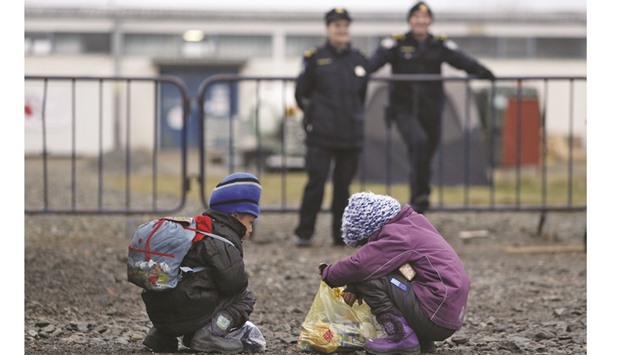Greece is trying to figure out how it will accommodate record numbers of migrants stranded in the EU’s southeastern-most country should countries further along the Balkan migration route block access for refugees trying to reach northern Europe.
Greece is counting on “unilateral moves” from Macedonia, the minister in charge of migrants, Ioannis Mouzalas, told Greek TV channel Mega yesterday.
A day earlier he said that closing the Balkan borders would strand tens of thousands of migrants in Greece.
Around 1mn people, including many refugees from war zones in the Middle East and Central Asia, passed along the Balkan route in 2015, most of them in the latter half of the year.
They mostly sailed from Turkey to Greek islands in the Aegean Sea, then crossed through Balkan countries such as Macedonia, Serbia, Hungary, Croatia and Slovenia intending to reach Austria and then Germany and other wealthy European countries.
Last month, Austria set off a wave of responses from countries upstream on the Balkan route, after saying it will limit the influx of asylum-seekers to 37,500 this year and a total of 127,500 until mid-2019.
Slovenia, Croatia, Serbia and Macedonia – which are between Austria and Greece on the Balkan route – responded with a filter allowing only Syrians, Afghans and Iraqis to pass to the north.
Austria’s decision to set a ceiling on the number of arriving asylum-seekers “will have consequences” on countries further along the Balkan route, Austrian Foreign Minister Sebastian Kurz said in Belgrade during a tour in southeastern Europe on Tuesday.
Many of the countries along the route are primarily equipped for short-term migrant stays, limiting their ability to take on refugees if the path closes further downstream.
Macedonia on Tuesday began reinforcing and expanding a fence along its southern border.
Yesterday Macedonian authorities began setting up a camp for migrants turned back by countries further along the route which are also narrowing the gates to new entries.
Serbia’s capacity to shelter people for a long period of time would be exhausted within three days at present arrivals rate, the UN refugee agency UNHCR warned.
The 17 existing centres for asylum-seekers and migrants in Serbia are equipped only for emergency shelter, not residence, UNHCR officials told the Belgrade daily Danas.
In any case, if other countries on the route close their gates, Serbia will immediately do the same, Foreign Minister Ivica Dacic said after meeting Kurz on Tuesday.

Migrant children search through a bag while being observed by police officers, at a refugee transit camp in Slavonski Brod, Croatia.
